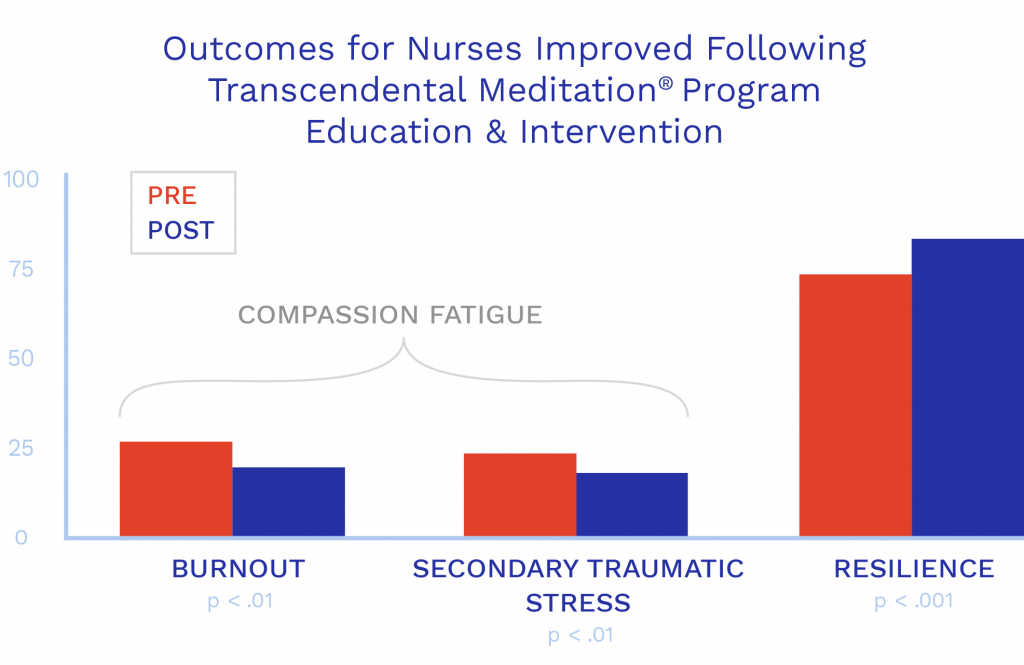A Scientific Approach
Evidence-based research on the TM technique shows it is twice as effective as other techniques in reducing anxiety and depression, while increasing energy, improving creativity and mental clarity, enhancing decision making under stress, and increasing resilience.
Other documented benefits of the TM technique include a reduction in high blood pressure after only a few weeks, decreased risk of heart disease and stroke, reduction in pain, decreased insomnia, and increased vitality, well-being and self-esteem.
A 2018 study, published in the International Journal for Human Caring, reported that the practice of TM increased peace and integrity, presence and balance, and enhanced job performance.
A 2018 pilot research study of nurses, published in Journal for Nurses in Professional Development, showed statistically significant improvements in compassion satisfaction, decreased burnout, decreased secondary traumatic stress and improved resilience.
Sexual Assault Advocates & Certified Domestic Violence Advocates
Advocates can face seemingly insurmountable challenges every day and are themselves at high risk for stress-related disease, compassion fatigue, vicarious traumatization, hopelessness and burnout. In addition, the frustration of not being able to affect positive change can be debilitating.
An advocate can best meet these challenges with reduced stress, clear thinking, good organizational and communication skills, and a resilient physiology—benefits of the Transcendental Meditation technique that have been documented among a broad range of benefits in over 400 published research studies.
When girls and women who have suffered from abuse and trauma learn TM, hope is restored, fear and PTSD dissolve, and life becomes balanced, peaceful and healthier.
Continuing Education
In Iowa, the Transcendental Meditation program for Advocates serving victims of domestic violence is approved for one credit per hour of course participation by Iowa CADV.
If you would like to take the TM course in any other state and wish to receive credits, please contact us at education@tm-women.org or (800) 635-7173 with the name of the accrediting agency in your state.
Comments shared from survivors
“I slept through the night for the first-time in years.”
“I feel so calm after meditating, thank you, thank you so much for sharing this with me.”
“I’ve never felt this good in life. It’s given me ‘me’ back.”
“Through TM I began to trust, blossom, and most of all, I began to heal…. This program has given me my life back.”
“I feel hopeful–life that has been gray for so long came back to colors with TM. I wish everybody had the opportunity to learn this.”
Patient Advocates
Understanding and navigating the American healthcare system is difficult. Therefore, patient advocacy entails guiding patients through the confusing maze of healthcare options and procedures patiently and efficiently. Patient advocates, whether employed in hospitals or non-profit organizations and working through community agencies or in independent practice, educate and lead patients through medical and financial processes.
A patient advocate can be responsible for coordinating communication between the patient and relevant health professionals, administrators, and insurance companies. The details can be endless and overwhelming for the patient–and even for the advocate. So an advocate must have strong communication skills, good organizing power, resilience, compassion and a supportive attitude.
All the qualities needed by a patient advocate are improved by the simple practice of the Transcendental Meditation technique, which reduces stress and improves mental acuity, psychological bbalance, and physical health.
“TM literally saved my life on those chaotic mornings when clients were upset or couldn’t focus. I found that my calm, careful manner settled them right away and we were able to work collaboratively. Adult clients in the most stressful situations—such as those with PTSD, sleep deprivation, or high parenting stress—who took the TM course were then better able to find ways to improve their lives.”
Mary Doan
RETIRED SOCIAL WORKER
Ready to Learn?
The Transcendental Meditation program is taught by our national 501(c)3 non-profit educational organization in a series of five meetings. During the pandemic, these meetings will be conducted socially distanced or in a combination of social distancing and online learning. Check with your agency for scholarship opportunities.

